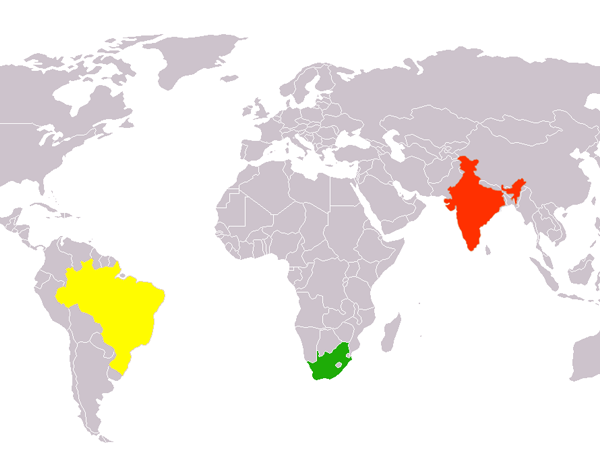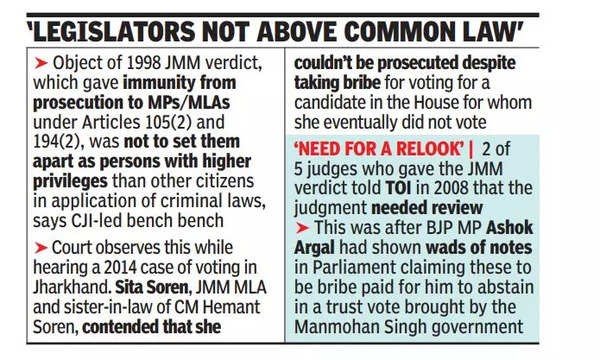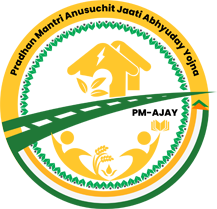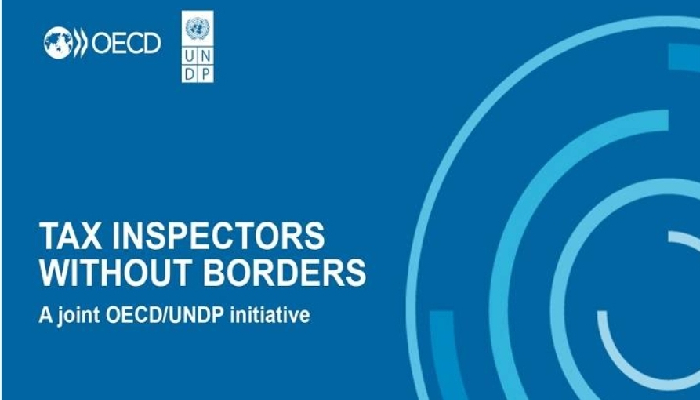
Electoral Bond Scheme
Subscribers of "Current Affairs" course can Download Daily Current Affairs in PDF/DOC
Subscribe to Never Miss an Important Update! Assured Discounts on New Products!
Must Join PMF IAS Telegram Channel & PMF IAS History Telegram Channel
- Context (TH): The SC has declared the Electoral Bonds Scheme unconstitutional.
- These bonds constituted an essential means of funding political parties since 2018.
- Donor anonymity was the main feature of the scheme, which has been criticised for long by transparency activists.
- The scheme was challenged shortly after it was announced by a number of parties, including the Communist Party of India (Marxist) and the Association for Democratic Reforms (ADR).
SC Ruling
- The SC declared the EBS and the amendments made to the following acts as unconstitutional-
- The Finance Act, 2017,
- The Representation of the People Act (RPA), 1951,
- The Income Tax Act 1961, and
- The Companies Act of 2013.
Restoration of Status Quo by SC
The SC’s judgement reinstated the legal framework before the Finance Act 2017 in several statutes.
Representation of the People Act, 1951
- Section 29C mandated political parties to disclose donations exceeding Rs 20,000, balancing the right to information with donor privacy.
- Finance Act, 2017 Intervention: Introduced an exception exempting donations from disclosure requirements via Electoral Bonds.
- SC Verdict: The amendment was struck down, emphasising the importance of transparency and privacy balance.
Companies Act, 2013
- Section 182 restricted corporate donations, imposing a cap (7.5% of the average profits of the preceding three fiscal years) and disclosure requirements.
- Finance Act, 2017 Intervention: The cap and disclosure obligations for corporate donations were removed.
- SC Verdict: Nullified the amendment, citing concerns about unchecked corporate influence on elections.
Income-tax Act, 1961
- Section 13A(b) mandated the maintenance of records for contributions above Rs 20,000.
- Finance Act, 2017 Intervention: Exempted Electoral Bond contributions from record-keeping requirements.
- SC Verdict: Struck down the amendment, upholding voters’ right to information.
SC Observations
Violation of the Right to Information
- Anonymous Political Donations: The scheme infringes upon the fundamental right to information under Article 19(1)(a) of the Constitution.
- Voters have a right to information that is essential for them to exercise their freedom to vote.
- The fundamental right to information is not just a means to an end but an end in itself.
- It not only fulfils the freedom of speech and expression but also plays a crucial role in participatory democracy by holding the government accountable.
- Economic inequality leads to differing levels of political engagement because of the deep association between money and politics.
- As a result, there is a possibility that financial contribution to a political party would lead to quid pro quo arrangements.
|
Not Proportionally Justified to Curb Black Money
- The SC applied the proportionality test to examine whether the scheme violated the voters’ right to information and the transparency of the electoral process
- The government did not adopt the least restrictive method to achieve its objective.
- SC Relied on the proportionality test laid down in its 2017 verdict in the KS Puttaswamy case.
- The CJI cited the least restrictive methods, such as the ₹20,000 cap on anonymous donations and the concept of Electoral Trusts.
- The purpose of curbing black money cannot be linked to any of the reasonable restrictions under Article 19(2); it cannot be said to be a legitimate purpose for restricting the FR to information.
- After the ‘basic structure doctrine’, SC has established a new red line for the state to be ‘least restrictive’ in the exercise of its legislative functions.
Proportionality Test
“Double proportionality” Test
|
Right to Donor Privacy Does Not Extend to Contributions Made
- Financial contributions to political parties are usually made for two reasons–
- As an expression of support and
- As a quid pro quo measure.
- Political contributions made by corporations should not be treated at par with financial contributions made by a student, a daily wage worker, an artist, or a teacher.
- The right to privacy only extends to contributions made as a genuine form of political support and does not extend to those contributions that may be made to influence policies.
Unlimited Corporate Donations Violate Free and Fair Elections
- The amendment made to the Companies Act 2013, permitting unlimited political contributions by companies, is arbitrary.
- The political contributions by individuals cannot be treated at par with those made by companies, as the latter is often made with the intent of securing benefits in return.
- The harm in the form of quid pro quo is much higher in the case of loss-making companies.
Institution of Hierarchy of Rights
- The SC, in its judgement, has used the proportionality test to calibrate a hierarchy of rights.
- Greater weightage has been assigned to an individual voter’s right to information on political funding than a corporate donor’s demand for a right to privacy.
Amendment to Section 29C of RPA, 1951 Quashed
- Initially, Section 29C of the RPA, 1951, required
- Parties to declare all contributions higher than ₹20,000 and
- Specify whether they were received from individual persons or companies.
- The SC observed that the original requirement to disclose contributions of more than ₹ 20,000 effectively balanced the voters’ right to information with the right to privacy of donors.
- Donations below this threshold were far less likely to influence political decisions.
Other Observations by SC
- The SBI has been ordered to stop the issuance of any further electoral bonds immediately.
- SBI will furnish details of such bonds purchased by political parties since April 12, 2019, to the ECI.
- Such details must include the date of purchase of each bond, the name of the purchaser of the bond and the denomination of the bond purchased.
- The ECI shall subsequently publish all such information shared by the SBI.
- Electoral bonds that are within the validity period of fifteen days but have not yet been encashed by the political party will have to be returned.
Legitimate state interest
- According to the ruling, the definition of ‘legitimate state interest’ will not be the exclusive purview of the state.
- The SC will examine the state’s definition of ‘legitimate state interest ‘ behind any legislative action, as was done in the case of the electoral bonds scheme.
Government’s Argument
- The government argued that curbing black money and protecting donor anonymity are legitimate state interests.
- Donor anonymity was presented as essential for upholding the right to privacy of donors, a FR.
- It allowed any person to transfer funds to political parties of their choice through legitimate banking channels and helped prevent unregulated contributions through cash.
- The GOI contended that the right to information doesn’t extend to seeking information that is not in the state’s knowledge.
- The government claimed that citizens did not have a general right to know the funding of political parties.
- The right to know was not general; it evolved by courts to enable voters to elect clean candidates.
Recommendations on Funding of Political Parties
Indrajit Gupta Committee on State Funding of Elections, 1998
- Endorsed state funding of elections to establish a fair playing field for parties with less financial resources.
Recommended limitations
- State funds are to be allocated only to national and state parties with allotted symbols, not independent candidates.
- State funding should be provided in kind, offering certain facilities to recognised political parties and their candidates.
- It acknowledged economic constraints and advocated partial rather than complete state funding.
Election Commission’s Recommendations
- The 2004 report emphasised the necessity for political parties to publish their accounts annually, allowing scrutiny by the general public and concerned entities.
- Audited accounts should be made public, with auditing performed by CAG-approved firms.
Law Commission, 1999
- Described total state funding of elections as “desirable” under the condition that political parties are prohibited from receiving funds from other sources.
- Proposed amending the RPA, 1951, introducing section 78A for maintenance, audit, and publication of political party accounts, with penalties for non-compliance.
How does Global Political Funding Differ from India?
Emphasis on Parties vs. Candidates
Global Example
- In the US, political funding often centres around individual candidates, with extensive fundraising efforts directed towards supporting their campaigns.
India’s Context
- India and other parliamentary systems prioritise funding frames centred on political parties, where donations are channelled to support party activities and campaigns collectively.
Donations Regulation
Global Practice
- Many jurisdictions impose bans or limits on specific donors, such as foreign entities or corporations, to prevent undue influence in political funding.
- For instance, US federal law imposes varying contribution limits based on the type of donor.
- Conversely, countries like the UK do not set contribution limits but instead opt for expenditure limits as a method of regulation.
India’s Context
- India regulates donations but lacks specific limits on individual contributions.
Expenditure Limits
Global Norms
- Expenditure caps are standard in global funding frameworks to mitigate financial dominance and ensure a level playing field for candidates or parties.
- UK enforce expenditure limits on political parties, such as the restriction of not spending more than 30,000 Euros (approximately Rs 30 lakh) per seat.
India’s Context
- India’s regulatory landscape lacks legal expenditure limits on parties, allowing them to spend freely on campaigns, potentially distorting electoral outcomes.
- ECI increased the expenditure limit for candidates-
- Lok Sabha constituencies: Rs 54 lakh-Rs 70 lakh (depending on state) to Rs 70 lakh-Rs 95 lakh.
- Assembly constituencies: Rs 20 lakh- Rs 28 lakh to Rs 28 lakh- Rs 40 lakh (depending on states).
Public Financing
Global Trends
- Many countries offer public funding for political parties based on various criteria.
- For example, in Germany, parties receive funds based on factors like past election performance, membership fees, and private donations. Additionally, political party foundations receive state funding.
- Seattle, US, has experimented with “democracy vouchers,” where eligible voters receive vouchers to donate to their chosen candidates.
Indian Context
- India’s public financing mechanisms are limited, with initiatives like the EBS raising concerns over transparency and accountability.
Balancing Transparency and Anonymity
International Practices
- By allowing small donors to remain anonymous while requiring disclosures for large donations.
- For instance, in the UK, parties must report donations exceeding 7,500 pounds in a calendar year, while in Germany, the limit is 10,000 Euros.
- Small donors are less likely to wield significant influence and are more vulnerable to victimisation, while large donors are more prone to engage in quid pro quo arrangements.
Indian Context
- India lacks donation limits on individuals and legal expenditure caps on parties, allowing unrestricted spending on campaigns.
Chilean Experiment
- The Chilean experiment aimed to achieve anonymity in party funding to prevent quid pro quo arrangements.
- Under this system, donors could transfer money to the Electoral Service, which would then forward it to the party without revealing the donor’s identity.
- However, coordination between donors and parties undermined the system’s effectiveness, as revealed by scandals in 2014-15.





![PMF IAS Environment for UPSC 2022-23 [paperback] PMF IAS [Nov 30, 2021]…](https://pmfias.b-cdn.net/wp-content/uploads/2024/04/pmfiasenvironmentforupsc2022-23paperbackpmfiasnov302021.jpg)











